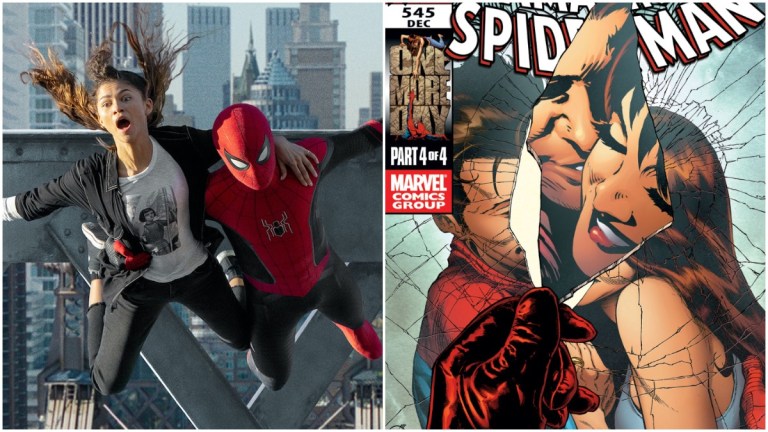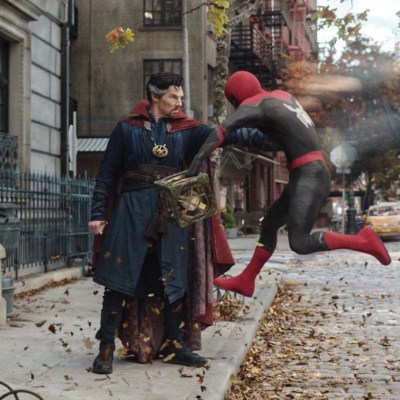Spider-Man: No Way Home Fixes the Worst Spidey Story Ever Written
Marvel Studios revisits one of the most infamous comic book stories ever written, “One More Day,” and finds a little more grace to it in Spider-Man: No Way Home.

This article contains massive Spider-Man: No Way Home spoilers.
It’s generally considered to be the worst Spider-Man story ever written; a contrived and hideous editorial exercise, engineered solely to erase Peter and Mary and Watson Parker’s marriage after 20 years of existence; a four-issue monument to everything that is awful and cynical about comic book storytelling and the laziness of retconning previous events.
One More Day, penned by J. Michael Straczynski, but penciled and truthfully masterminded by then-Marvel Comics editor-in-chief Joe Quesada, is a narrative monstrosity that betrayed everything good about the Peter Parker and MJ characters in service to a woefully misguided commercial decision from upstairs. And it just became the climactic linchpin of Kevin Feige’s first Spider-Man movie trilogy, as well as the cathartic resolution to Spider-Man: No Way Home, the currently best reviewed live-action Spidey flick ever made.
How? What? Why?!
After so many years and so many superhero movies, Marvel Studios and several of their competitors have developed a habit of improving on narratives that had interesting ideas but flawed executions in the comic pages. Civil War was a gargantuan Marvel Comics event that turned out to be a lot of hype with a muddled and confused storyline. Nevertheless, it was transformed into one of the better MCU movies when it was told through the lens of Captain America. Old Man Logan, meanwhile, was reimagined from being an easter egg guide where the Marvel Universe now lived on Fury Road, and instead became something quite poignant with a character like Wolverine having to face real mortality.
But One More Day? Released across four issues in 2007, this book always seemed narratively and creatively bankrupt. The story is about Peter and Mary Jane, who had one of the healthier and better written superhero marriages to spring up from comics in the 1980s and ‘90s, being written into a corner and then agreeing to a preposterous deal with the Devil, or the closest approximation of the Dark Prince in Marvel Comics. With Aunt May on her deathbed after a sniper aimed for Peter and missed, Marvel’s resident demon, Mephisto, approaches Peter and MJ and offers to use magic to erase May’s terminal wound… if Peter and MJ agree to erase their marriage from existence, including both of their memories of it.
Why a demon is out to collect happy memories, as if he is a hacker ransoming a suburban family’s iCloud photos, isn’t exactly clear. Nor is their interest in it being so. The awful choice to write this dreck was made because Quesada and several other members of Marvel’s editorial braintrust felt Peter was too un-relatable to young readers as a married man, and they could sell more books if he was single again. But, simultaneously, making him a widow or divorcée also seemed to age him into a sad sack (there was a trial separation half a decade earlier in the comics that didn’t land with the readers either, so Marvel writers had to backtrack).
Thus, even allegedly against the wishes of the technical author of One More Day, Marvel boxed Peter and MJ into this absurd corner, beginning by having Peter become Iron Man’s sidekick and then, quite uncharacteristically, unmask himself on national television.
Sound familiar?
Every choice leading up to One More Day, from Peter Parker turning into a fame-seeking bonehead to Tony Stark awkwardly transforming into a caricature of then-President George W. Bush so Peter (and half the Avengers) would have a reason to go against him, was hackneyed and unsatisfying, but little of it was written with characterization or effective storytelling in mind. It was a series of contrivances implemented to reach an editor’s predetermined commercial outcome.
They’ll make Peter feel alone, feel responsible that Aunt May is about to die, and be desperate enough to convince his wife to call it quits in a way that absolves future writers from ever having to tackle that relationship’s baggage. Like magic, it’ll be gone from our collective memory.
It was a poor decision that turned off many readers, including some of those young ones Quesada thought he was courting (including this one at the time).
All of which is interesting to consider since Spider-Man: No Way Home also uses many of the same narrative building blocks that led to the wretchedness of One More Day, and likewise culminates with the infamous erasure of a Peter and MJ romance… and yet that very bittersweet resolution ends up being one of the movie’s greatest strengths instead of a case study in bad writing.
The distinctions begin with how the groundwork is laid out in 2019’s Spider-Man: Far From Home, which concluded on the cliffhanger of Jake Gyllenhaal’s Mysterio revealing that Peter Parker is Spider-Man. In a shocker that left fans howling, Peter’s world had just been flipped upside down, and in a way that echoed the comic book events that led to One More Day. Except on the page, Peter Parker inexplicably acted out of character by unmasking himself to the world. On-screen, the Tom Holland version was much more organically pushed into this position by an enemy who knew his secret identity.
As for what would come next, producer Feige, director Jon Watts, screenwriters Chris McKenna and Erik Sommers, and whoever else looked at the mess that was late-2000s Spider-Man comics and saw an actually interesting idea that had just been poorly handled. Still, right up to and including the release of Spider-Man: No Way Home, it seemed doubtful Marvel would ever go anywhere near One More Day (despite amusing fan theories about Benedict Cumberbatch’s Doctor Strange being Mephisto).
Yes, the trailer revealed the movie would use magic as a pretext for Spidey shattering the multiverse, and thereby inviting all the most popular villains from past Spider-Man movies (plus Electro) into the MCU. But that wouldn’t mean Peter would actually get to hand wave his problems away with magic, or that Peter and MJ would be asked to erase their much younger and developing relationship.
And yet, that’s pretty much what happened. At the end of the movie, the entire fabric of the MCU’s dimensional plane is about to break because every conceivable variant in the multiverse who knows Peter Parker is Spider-Man is about to come crashing into this dimension. So Peter and Doc Strange make a judgment call: the only way to save this universe is to cause everyone to forget who Peter Parker is. And that includes MJ.
Hence the big tearjerker moment of the climax where Holland’s Peter and Zendaya’s MJ, plus Pete’s BFF Ned Leeds (Jacob Batalon), are forced to say goodbye because the latter two are going to forget their relationship with Peter—just like everyone else in the universe.
While the basic outcome is the same—Peter and MJ are separated, and the shared history between the pair is lost—the reason why, and the fallout of how, is far more sophisticated and dramatically satisfying.
In One More Day, the entire point of that story is an exercise in regression. Quesada and several others wanted Peter Parker to regress—transform into the character he was when they grew up with the comics: a fresh out-of-college schmuck who can’t hold a steady job or girl. The irony is that arguably more than any other character in comicdom, the appeal of Peter Parker is he’s the everyman with a tractable biography who (slowly) grows and changes. At least until 2007. Readers were able to follow him from high school to college, to failed grad school student, to professional, just as they were able to follow him from loner, to member of a tight group of friends, to husband.
In many ways, it was an unnatural betrayal of the appeal of the Peter Parker character, as well as Mary Jane, to cause them to go backwards. Additionally, the way this was implemented was by having Peter and MJ both agree because it would also erase their pained guilt over Aunt May’s predicament. On top of his still bizarre choice to have his company’s mascot make a Faustian bargain with a devil and get away with it, Quesada forced Peter and MJ to make a selfish choice intended to ease their own personal burdens in order to justify the narrative outcome Quesada wanted.
Now compare that to what actually occurs in Spider-Man: No Way Home. In addition to evoking OMD by having Aunt May (Marisa Tomei) die midway through the movie, the new film also allows May to instill in Peter this wisdom: He should not take the easy path for his own personal comfort.
Earlier in the movie, Peter and May discover they have a way to send all the villains back to their own timelines—Doc Ock (Alfred Molina), Electro (Foxx), and even the haunted Norman Osborn (Willem Dafoe). Yet banishing these three back to their own universes also amounts to passing a death sentence on them, as they were all transferred to the MCU moments before they died in the previous movies while doing villainous things. But Peter is ready to say “that’s not my problem.”
The MCU May, however, reminds Peter of a lesson that his comic book counterpart should’ve already known: You’re the good person who makes the right choice, even when it’s the hard one. Rather than condemn these men, Peter can try to save them from their own proverbial demons in the far more sci-fi MCU, and then send them home with reclamation.
This lesson from May—complete with the eventual utterance of “with great power there must also come great responsibility”—gets to the heart of Peter and the whole Parker family’s character. Which is why May absolves Peter of feeling guilt over her wounds, including when she actually dies from a slash inflicted by Osborn. One imagines the literary May also would’ve asked her happily married nephew/surrogate son not to sacrifice his marriage in order to buy her a few more years, but the comic book writers made sure she was in a coma so as to prevent that hiccup.
Which brings us back to the end of the film. When Peter Parker realizes his entire universe is about to end, he asks Strange to erase not just his Spider-Man celebrity from the planet’s collective memory, but knowledge of Peter’s very existence. This is not done to ease his own personal burden or anxiety; it’s done to save the universe. Granted, it’s just another Tuesday when a Marvel movie ends by raising the stakes to the fate of the world and/or galaxy. Even so, it is still a choice that’s in the right direction, because Peter is doing this for (a lot of) other folks’ well-being instead of his own.
More crucially though, it does not erase Peter’s personal growth as a character. While it is still somewhat a disservice to Zendaya’s MJ that the growth her character earned by coming out of her shell with Peter is reversed, at least for Holland’s Parker, those narrative events still have substantial meaning for his character and personality. Unlike the comic book Peter, he isn’t potentially setting himself up to repeat his emotional growth and maturity as a human being ad infinitum like those poor bastards in Eternal Sunshine of the Spotless Mind.
Peter retains memories of his relationship with MJ and Ned Leeds, and those memories, and the high price of erasing those relationships, haunt and inform his character going forward. This includes the surprising choice to (at least for now) not rekindle his relationship with either.
Now completely on his own and alienated—but also in the big city and closer to the comic book Spider-Man who didn’t have Iron Man’s fortune and gadgets to hide behind—Peter learned the hard lessons his comic book counterpart never did in One More Day. At the beginning of No Way Home, Peter went to Doctor Strange, much like the literary version wound up meeting with Mephisto, in order to use magic to heal his own personal problems. But unlike the comic book version, the cinematic Peter learned life isn’t about magic fixes and do-overs.
One More Day regressed the character; No Way Home progressed him. Which makes the loss of his (admittedly much shorter and totally rebuildable) relationship with MJ much more cathartically satisfying in its bitterness, instead of feeling like bad writing’s cheap stunt.
Spider-Man: No Way Home is in theaters now.


